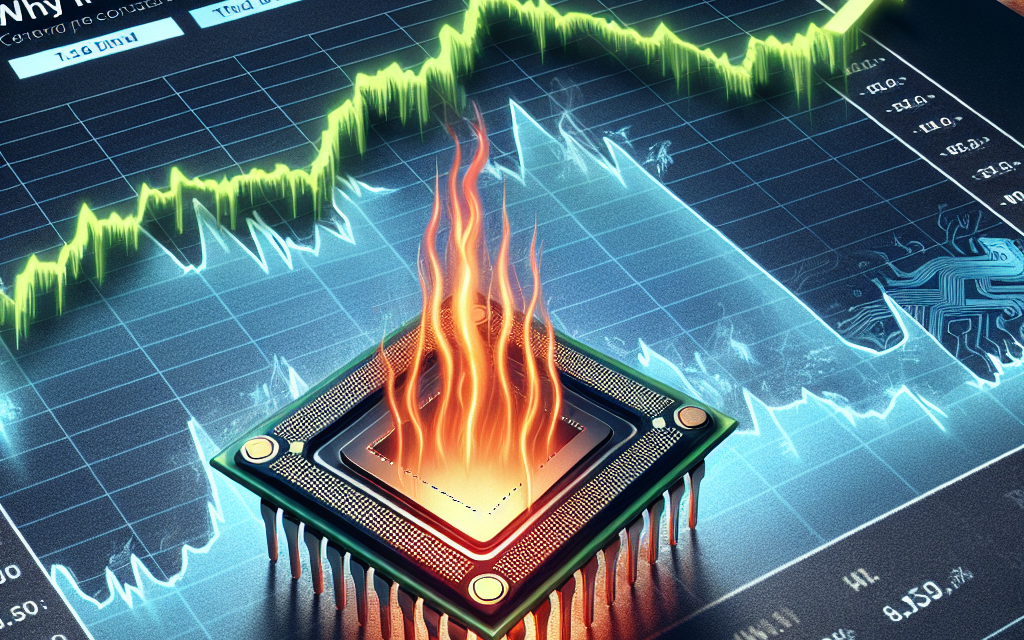“Navigating the Heat: Why Nvidia’s Future Remains Bright Despite Blackwell Chip Concerns”
Introduction
Nvidia, a leading player in the semiconductor industry, recently experienced a dip in its share prices following concerns about potential overheating issues with its new Blackwell chip. This development has sparked apprehension among investors, who are wary of the implications such technical challenges could have on the company’s market performance and future growth prospects. However, despite these immediate concerns, there are several reasons why investors should maintain a level-headed perspective. Nvidia’s robust track record of innovation, its strategic positioning in the burgeoning AI and data center markets, and its proactive approach to addressing technical challenges suggest that the company is well-equipped to navigate this hurdle. As the situation unfolds, it is crucial for investors to focus on Nvidia’s long-term potential and strategic initiatives, which continue to position it as a formidable force in the tech industry.
Understanding The Blackwell Chip: What Investors Need To Know
Nvidia, a leading name in the semiconductor industry, has recently faced a dip in its share prices, primarily due to concerns surrounding its latest Blackwell chip. This development has understandably caused a stir among investors, prompting questions about the potential impact on Nvidia’s market position and future growth. However, it is crucial for investors to maintain a level-headed perspective and understand the broader context of these concerns.
The Blackwell chip, Nvidia’s latest innovation, represents a significant leap forward in processing power and efficiency. Designed to cater to the growing demands of artificial intelligence and high-performance computing, the chip is expected to deliver unprecedented performance metrics. However, reports of overheating issues have surfaced, raising alarms about the chip’s reliability and long-term viability. While these concerns are valid, it is important to consider the nature of technological advancements and the challenges that often accompany them.
Firstly, it is not uncommon for new technology to encounter initial hurdles. The development of cutting-edge hardware is a complex process, often involving unforeseen challenges that require time and resources to address. Nvidia’s track record in overcoming such obstacles is well-documented, and the company has consistently demonstrated its ability to innovate and adapt. Therefore, while the overheating issues with the Blackwell chip are concerning, they are not necessarily indicative of a long-term problem.
Moreover, Nvidia’s commitment to research and development is a reassuring factor for investors. The company has a history of investing heavily in R&D, ensuring that it remains at the forefront of technological advancements. This commitment not only facilitates the resolution of current issues but also positions Nvidia to capitalize on future opportunities. As such, investors can take solace in the fact that Nvidia is likely to address the overheating concerns with the same diligence and expertise that have characterized its past successes.
In addition to Nvidia’s internal capabilities, the broader market context should also be considered. The demand for high-performance computing and AI solutions is on an upward trajectory, driven by sectors such as autonomous vehicles, data centers, and machine learning. Nvidia’s strategic positioning within these markets provides a strong foundation for future growth, irrespective of the current challenges with the Blackwell chip. The company’s established relationships with key industry players further enhance its ability to navigate temporary setbacks and maintain its competitive edge.
Furthermore, it is essential to recognize that market reactions to technological issues can often be disproportionate. The initial dip in Nvidia’s share prices may reflect short-term uncertainty, but it does not necessarily capture the company’s long-term potential. Investors should be wary of making hasty decisions based on immediate market fluctuations and instead focus on the underlying fundamentals that drive Nvidia’s business.
In conclusion, while the overheating concerns surrounding Nvidia’s Blackwell chip have understandably caused a stir, investors should remain calm and consider the broader context. Nvidia’s proven track record, commitment to innovation, and strategic market positioning provide a solid foundation for addressing current challenges and capitalizing on future opportunities. By maintaining a long-term perspective and focusing on the company’s core strengths, investors can navigate the current uncertainty with confidence and poise.
Historical Performance: Nvidia’s Resilience In The Face Of Challenges
Nvidia Corporation, a titan in the semiconductor industry, has long been a beacon of innovation and resilience. Despite recent concerns over the overheating issues of its latest Blackwell chip, history suggests that Nvidia has the capacity to navigate such challenges effectively. Investors, therefore, should consider the company’s historical performance as a testament to its ability to overcome obstacles and maintain its trajectory of growth.
Over the years, Nvidia has consistently demonstrated an impressive ability to adapt to the rapidly evolving technological landscape. This adaptability has been a cornerstone of its success, allowing the company to not only survive but thrive amid various industry challenges. For instance, during the cryptocurrency boom, Nvidia faced significant volatility as demand for its graphics processing units (GPUs) fluctuated. Despite this, the company managed to stabilize its operations and even capitalize on the burgeoning interest in artificial intelligence and machine learning, which required advanced GPU technology.
Moreover, Nvidia’s strategic investments in research and development have consistently positioned it at the forefront of technological advancements. This commitment to innovation has enabled the company to introduce groundbreaking products that have set industry standards. The introduction of the Turing architecture, for example, marked a significant leap in GPU technology, offering real-time ray tracing capabilities that revolutionized graphics rendering. Such innovations have not only solidified Nvidia’s market position but also underscored its resilience in the face of technical challenges.
In addition to its technological prowess, Nvidia’s financial performance has been robust, further illustrating its resilience. The company has consistently reported strong revenue growth, driven by its diverse product portfolio and expansion into new markets. This financial strength provides Nvidia with the resources necessary to address and rectify any technical issues, such as the current concerns surrounding the Blackwell chip. Historically, Nvidia has shown a proactive approach in resolving product-related challenges, often turning potential setbacks into opportunities for improvement and innovation.
Furthermore, Nvidia’s leadership has played a crucial role in steering the company through turbulent times. Under the guidance of CEO Jensen Huang, Nvidia has maintained a clear strategic vision, focusing on long-term growth and sustainability. This leadership has been instrumental in fostering a corporate culture that prioritizes innovation and excellence, ensuring that the company remains resilient even when faced with significant challenges.
While the recent dip in Nvidia’s shares due to the Blackwell chip overheating concerns may cause some investors to worry, it is important to view this situation within the broader context of Nvidia’s historical performance. The company’s track record of overcoming technical and market-related challenges suggests that it is well-equipped to address the current issue. Moreover, Nvidia’s ongoing commitment to innovation and its strong financial position provide a solid foundation for continued growth.
In conclusion, while short-term fluctuations in stock prices can be unsettling, investors should remain calm and consider Nvidia’s historical resilience. The company’s ability to adapt, innovate, and thrive in the face of challenges has been proven time and again. As Nvidia works to resolve the Blackwell chip issues, its history suggests that it will emerge stronger, continuing to lead the semiconductor industry into the future.
Market Volatility: How Temporary Dips Can Present Opportunities
Nvidia, a leading player in the semiconductor industry, recently experienced a dip in its share prices, primarily due to concerns surrounding the overheating of its new Blackwell chips. This development has understandably caused some unease among investors, who are wary of the potential implications for the company’s future performance. However, it is crucial to approach this situation with a measured perspective, recognizing that market volatility often presents opportunities for strategic investment rather than reasons for panic.
To begin with, it is important to understand the context in which Nvidia operates. The company has consistently demonstrated its ability to innovate and adapt in a rapidly evolving technological landscape. Its products are integral to a wide range of applications, from gaming and artificial intelligence to data centers and autonomous vehicles. This diversification not only underscores Nvidia’s resilience but also highlights its potential for sustained growth. Therefore, while the overheating issue with the Blackwell chips is a legitimate concern, it is unlikely to undermine the company’s long-term trajectory.
Moreover, temporary dips in stock prices are not uncommon in the technology sector, where rapid advancements and intense competition can lead to fluctuations. Historically, Nvidia has navigated similar challenges successfully, leveraging its robust research and development capabilities to address technical setbacks. The company’s track record of overcoming obstacles and delivering cutting-edge solutions should reassure investors that it is well-equipped to resolve the current issue with the Blackwell chips.
In addition, it is worth noting that the market’s reaction to such news is often amplified by short-term speculation and emotional responses. This can create a disconnect between a company’s intrinsic value and its market valuation, presenting astute investors with opportunities to acquire shares at a discount. By maintaining a focus on Nvidia’s fundamental strengths and long-term prospects, investors can capitalize on these temporary dips to enhance their portfolios.
Furthermore, Nvidia’s strategic partnerships and collaborations with industry leaders provide an additional layer of confidence. These alliances not only facilitate the development of innovative technologies but also expand the company’s reach into new markets. As Nvidia continues to forge these relationships, it is likely to bolster its competitive position and drive future growth, mitigating the impact of any short-term setbacks.
It is also essential to consider the broader market dynamics that influence Nvidia’s performance. The demand for semiconductors remains robust, driven by the proliferation of digital technologies and the increasing reliance on data-driven solutions. This trend is expected to persist, providing a favorable backdrop for Nvidia’s continued expansion. Consequently, while the Blackwell chip issue may pose a temporary challenge, the underlying demand for Nvidia’s products is unlikely to wane.
In conclusion, while the recent dip in Nvidia’s share prices may cause concern among some investors, it is important to maintain a balanced perspective. The company’s history of innovation, strategic partnerships, and strong market position suggest that it is well-prepared to address the current challenges and continue its growth trajectory. By viewing market volatility as an opportunity rather than a threat, investors can make informed decisions that align with their long-term financial goals. As such, staying calm and focusing on the bigger picture can ultimately yield significant rewards in the ever-evolving landscape of technology investments.
Technological Innovation: Nvidia’s Track Record Of Overcoming Setbacks

Nvidia, a titan in the semiconductor industry, recently faced a dip in its share prices due to concerns surrounding its latest Blackwell chip overheating. While such news might initially unsettle investors, it is crucial to consider Nvidia’s historical resilience and innovative prowess before making hasty decisions. The company’s track record of overcoming setbacks provides a reassuring context for understanding the current situation.
To begin with, Nvidia has consistently demonstrated an ability to navigate technological challenges with agility and foresight. Over the years, the company has encountered various hurdles, from supply chain disruptions to intense competition. However, it has always emerged stronger, thanks to its commitment to research and development. This dedication has enabled Nvidia to not only address immediate issues but also to anticipate future trends and demands. For instance, when faced with the challenge of transitioning from traditional graphics processing units (GPUs) to more advanced architectures, Nvidia successfully adapted by investing in AI and machine learning technologies. This strategic pivot not only solidified its market position but also opened new avenues for growth.
Moreover, Nvidia’s robust ecosystem of partnerships and collaborations further underscores its capacity to overcome setbacks. By working closely with industry leaders, academic institutions, and research organizations, Nvidia has fostered an environment of innovation and problem-solving. This collaborative approach ensures that the company is well-equipped to tackle technical challenges, such as the current overheating concerns with the Blackwell chip. Through these partnerships, Nvidia can leverage external expertise and resources, thereby accelerating the development of effective solutions.
In addition to its collaborative efforts, Nvidia’s commitment to transparency and communication with stakeholders is another factor that should reassure investors. The company has a history of addressing issues head-on, providing timely updates and detailed explanations to its shareholders. This openness not only builds trust but also demonstrates Nvidia’s confidence in its ability to resolve challenges. In the case of the Blackwell chip, Nvidia has already initiated a thorough investigation to identify the root cause of the overheating issue. By keeping investors informed throughout this process, the company reinforces its reputation as a reliable and accountable industry leader.
Furthermore, it is important to recognize the broader context in which Nvidia operates. The semiconductor industry is inherently complex and rapidly evolving, with companies constantly pushing the boundaries of technology. In such a dynamic environment, occasional setbacks are not uncommon. However, Nvidia’s proven track record of innovation and adaptability positions it well to navigate these challenges. The company’s ability to learn from past experiences and apply those lessons to future endeavors is a testament to its resilience and long-term vision.
In conclusion, while the recent dip in Nvidia’s share prices due to Blackwell chip overheating concerns may cause some unease, investors should remain calm and consider the company’s history of overcoming setbacks. Nvidia’s unwavering commitment to innovation, strategic partnerships, transparent communication, and adaptability in a complex industry landscape all contribute to its enduring success. As the company works diligently to address the current issue, investors can take confidence in Nvidia’s proven ability to emerge stronger from challenges, ultimately reinforcing its position as a leader in technological innovation.
Investor Strategies: Long-Term Vs. Short-Term Perspectives
Nvidia, a titan in the semiconductor industry, recently faced a dip in its share prices due to concerns surrounding its latest Blackwell chip, which has reportedly been experiencing overheating issues. This development has understandably caused a stir among investors, prompting a reevaluation of their strategies. However, it is crucial to approach this situation with a balanced perspective, considering both long-term and short-term investment strategies.
In the short term, the market’s reaction to the overheating concerns is not entirely unexpected. Investors often respond swiftly to news that could potentially impact a company’s performance, leading to fluctuations in stock prices. The immediate dip in Nvidia’s shares reflects this typical market behavior. Short-term investors, particularly those engaged in day trading or swing trading, might view this as an opportunity to capitalize on the volatility. They may choose to buy shares at a lower price, anticipating a rebound once the company addresses the technical issues. However, this approach requires a keen understanding of market trends and a tolerance for risk, as the stock could continue to fluctuate based on further developments.
Conversely, long-term investors might adopt a different perspective. Nvidia has a robust track record of innovation and market leadership, particularly in the fields of artificial intelligence and graphics processing units. The company’s strategic initiatives and investments in research and development have consistently positioned it at the forefront of technological advancements. From this vantage point, the current overheating issue with the Blackwell chip could be seen as a temporary setback rather than a fundamental flaw in the company’s trajectory. Long-term investors might focus on Nvidia’s overall growth potential, considering factors such as its expanding market share, strategic partnerships, and the increasing demand for high-performance computing solutions.
Moreover, it is essential to recognize that technological challenges are not uncommon in the semiconductor industry. Companies often encounter hurdles during the development and deployment of cutting-edge technologies. Nvidia’s ability to swiftly address and resolve these issues will be a testament to its resilience and commitment to quality. Investors with a long-term outlook might view this as an opportunity to assess the company’s problem-solving capabilities and its dedication to maintaining its competitive edge.
Furthermore, Nvidia’s financial health remains strong, with a solid balance sheet and a history of delivering impressive revenue growth. This financial stability provides a cushion against short-term market fluctuations and allows the company to invest in resolving technical challenges effectively. Long-term investors might take comfort in this financial robustness, viewing it as a foundation for sustained growth and innovation.
In conclusion, while the overheating concerns surrounding Nvidia’s Blackwell chip have led to a dip in share prices, it is crucial for investors to maintain a balanced perspective. Short-term investors may find opportunities in the volatility, while long-term investors can focus on the company’s proven track record and growth potential. By considering both short-term and long-term strategies, investors can navigate the current situation with a comprehensive understanding of Nvidia’s position in the market. Ultimately, staying informed and maintaining a clear investment strategy will be key to making sound decisions in the face of market fluctuations.
Industry Trends: The Growing Demand For Advanced Chips
Nvidia, a leading player in the semiconductor industry, recently experienced a dip in its share prices, primarily due to concerns surrounding its latest Blackwell chip. Reports of overheating issues have surfaced, causing apprehension among investors and industry analysts alike. However, it is crucial to understand the broader context of the semiconductor market and the growing demand for advanced chips to appreciate why investors should remain calm.
The semiconductor industry is currently undergoing a transformative phase, driven by the increasing need for more powerful and efficient chips. This demand is fueled by advancements in artificial intelligence, machine learning, and data processing, which require sophisticated hardware to support complex computations. Nvidia, known for its cutting-edge graphics processing units (GPUs), has been at the forefront of this technological evolution, consistently pushing the boundaries of chip performance.
Despite the recent concerns, it is important to recognize that product development in the semiconductor industry is inherently complex and iterative. The process of designing and manufacturing advanced chips involves numerous challenges, including thermal management. Overheating is a common issue that many companies face during the initial stages of product rollout. Nvidia’s Blackwell chip, while currently under scrutiny, represents a significant leap in technology, and such teething problems are not uncommon in the industry.
Moreover, Nvidia has a strong track record of addressing technical challenges and delivering high-quality products. The company has consistently demonstrated its ability to innovate and adapt, which has been a key factor in its sustained success. Investors should take comfort in Nvidia’s history of overcoming obstacles and its commitment to resolving any issues with the Blackwell chip. The company’s robust research and development capabilities, coupled with its strategic partnerships, position it well to address the overheating concerns effectively.
In addition to Nvidia’s internal strengths, the external market dynamics also provide a reason for optimism. The demand for advanced chips is expected to continue growing, driven by the proliferation of technologies such as autonomous vehicles, the Internet of Things (IoT), and 5G networks. These technologies require high-performance computing power, which Nvidia’s products are well-suited to provide. As industries increasingly rely on data-driven solutions, the need for powerful chips will only intensify, creating a favorable environment for Nvidia’s long-term growth.
Furthermore, Nvidia’s strategic initiatives, such as its focus on expanding into new markets and diversifying its product portfolio, underscore its resilience and adaptability. The company’s efforts to penetrate sectors beyond gaming, such as data centers and professional visualization, highlight its commitment to capturing emerging opportunities. These initiatives not only mitigate risks associated with any single product line but also position Nvidia to capitalize on the broader industry trends.
In conclusion, while the recent dip in Nvidia’s share prices due to Blackwell chip overheating concerns may cause temporary unease, it is essential to view the situation within the larger context of the semiconductor industry. The growing demand for advanced chips, Nvidia’s proven track record, and its strategic initiatives all point to a promising future. Investors should remain calm and confident in Nvidia’s ability to navigate these challenges and continue to play a pivotal role in shaping the future of technology.
Expert Opinions: Why Analysts Remain Optimistic About Nvidia’s Future
Nvidia, a titan in the semiconductor industry, recently faced a dip in its share prices following reports of overheating issues with its latest Blackwell chips. This development has understandably caused some concern among investors, who are wary of potential setbacks in the company’s growth trajectory. However, despite these immediate challenges, many analysts remain optimistic about Nvidia’s long-term prospects. Their confidence is rooted in several key factors that suggest the company is well-positioned to navigate this temporary hurdle and continue its upward trajectory.
To begin with, Nvidia’s track record of innovation and adaptability provides a solid foundation for overcoming technical challenges. The company has consistently demonstrated its ability to address and rectify product issues swiftly, ensuring minimal disruption to its operations. This resilience is evident in its past responses to similar challenges, where Nvidia not only resolved technical problems but also leveraged them as opportunities to enhance product performance and customer satisfaction. Consequently, analysts believe that the current overheating concerns with the Blackwell chips will be addressed with the same level of efficiency and expertise.
Moreover, Nvidia’s strategic investments in research and development underscore its commitment to maintaining a competitive edge in the rapidly evolving tech landscape. The company allocates a significant portion of its revenue to R&D, fostering a culture of continuous improvement and innovation. This focus on advancing technology ensures that Nvidia remains at the forefront of the semiconductor industry, capable of delivering cutting-edge solutions that meet the demands of an increasingly digital world. As such, analysts are confident that Nvidia’s ongoing R&D efforts will not only resolve the current chip issues but also pave the way for future breakthroughs.
In addition to its robust R&D initiatives, Nvidia’s diversified product portfolio serves as a buffer against isolated product setbacks. The company’s offerings extend beyond graphics processing units (GPUs) to include data center solutions, artificial intelligence (AI) applications, and automotive technologies. This diversification mitigates the impact of any single product issue on the company’s overall performance, providing a stable revenue stream that supports continued growth. Analysts highlight this diversification as a key factor in their optimistic outlook, as it positions Nvidia to capitalize on multiple growth opportunities across various sectors.
Furthermore, the global demand for Nvidia’s products remains strong, driven by the increasing adoption of AI, machine learning, and high-performance computing. These technologies are integral to numerous industries, from healthcare to finance, and Nvidia’s expertise in these areas ensures sustained demand for its solutions. The company’s strategic partnerships and collaborations with leading tech firms further bolster its market position, enhancing its ability to capture emerging opportunities in the digital economy.
Finally, it is important to consider the broader market context in which Nvidia operates. The semiconductor industry is characterized by cyclical fluctuations, and short-term challenges are not uncommon. However, the long-term growth prospects for the industry remain robust, fueled by technological advancements and the proliferation of digital applications. Analysts emphasize that Nvidia’s strong fundamentals, coupled with its strategic vision, position it well to weather temporary setbacks and capitalize on the industry’s growth trajectory.
In conclusion, while the recent overheating concerns with Nvidia’s Blackwell chips have understandably caused some investor apprehension, analysts remain confident in the company’s ability to address these issues and continue its growth journey. By focusing on innovation, diversification, and strategic partnerships, Nvidia is well-equipped to navigate the current challenges and emerge stronger in the long run. Investors are thus encouraged to maintain a long-term perspective, recognizing the company’s potential to deliver sustained value in the evolving tech landscape.
Q&A
1. **What caused Nvidia shares to dip?**
Concerns over the overheating of Nvidia’s new Blackwell chips led to a dip in the company’s share prices.
2. **What are Blackwell chips?**
Blackwell chips are Nvidia’s latest generation of graphics processing units (GPUs), designed to offer enhanced performance and efficiency.
3. **Why are investors worried about the overheating issue?**
Overheating can lead to reduced performance, potential hardware damage, and increased returns or warranty claims, which could impact Nvidia’s financial performance.
4. **How has Nvidia responded to the overheating concerns?**
Nvidia has acknowledged the issue and is reportedly working on software and hardware solutions to mitigate the overheating problems.
5. **What is the potential impact of this issue on Nvidia’s market position?**
While the overheating issue could temporarily affect sales and customer trust, Nvidia’s strong market position and history of innovation may help it recover.
6. **Why should investors stay calm despite the dip in shares?**
Nvidia has a track record of addressing technical challenges effectively, and the overall demand for GPUs remains strong, suggesting long-term growth potential.
7. **What are analysts saying about Nvidia’s future prospects?**
Analysts generally remain optimistic about Nvidia’s future, citing its leadership in AI and gaming markets, and expect the company to resolve the overheating issues successfully.
Conclusion
Nvidia’s shares have recently experienced a dip due to concerns about overheating issues with their new Blackwell chips. While such technical challenges can initially unsettle investors, it’s important to maintain perspective. Nvidia has a strong track record of innovation and addressing technical setbacks, which suggests they are likely to resolve these issues effectively. Additionally, the demand for high-performance computing and AI technologies continues to grow, providing a robust market for Nvidia’s products. Investors should consider the company’s long-term potential and its ability to adapt and innovate in a rapidly evolving tech landscape. Therefore, while short-term fluctuations are inevitable, the underlying fundamentals and growth prospects of Nvidia remain strong, suggesting that investors should remain calm and focused on the long-term outlook.





